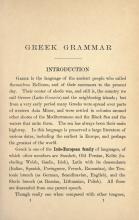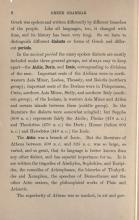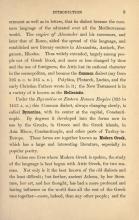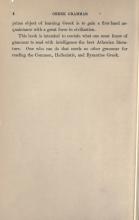Greek is the language of the ancient people who called themselves Hellenes, and of their successors to the present day. Their center of abode was, and still is, the country we call Greece (Latin Graecia) and the neighboring islands; but from a very early period many Greeks were spread over parts οf western Asia Minor, and were settled in colonies around οther shores of the Mediterranean and the Black Sea and the waters that unite them. The sea has always been their main highway. In this language is preserved a large literature of various dates, including the earliest in Europe, and perhaps the greatest of the world.
Greek is one of the Indo-European family of languages, of which other members are Sanskrit, Old Persian, Celtic (including Welsh, Gaelic, Irish), Latin with its descendants (Italian, Spanish, Portuguese, French, Rumanian), the Teutonic branch (as German, Scandinavian, English), and the Slavic branch (as Russian, Lithuanian, Polish). All these are descended from one parent speech.
Though really one when compared with other tongues, Greek was spoken and written differently by different branches οf the people. Like all languages, too, it changed with time, and its history has been very long. So we have to distinguish different dialects or forms of Greek and different periods.
In the ancient period the many spoken dialects are mostly included under three general groups, not always easy to distinguish—the Aiolic, Doric, and Ionic—corresponding to divisions οf the race. Important seats of the Aiolians were in northwestern Asia Minor, Lesbos, Thessaly, and Boiotia (northern group); important seats of the Dorians were in the Peloponnese, Crete, southern Asia Minor, Sicily, and southern Italy (southern group); of the Ionians, in western Asia Minor and Attica and certain islands between them (middle group). In the literature the dialects were somewhat mingled; but Sappho (600 B.C.) represents fairly the Aiolic; Pindar (470 B.C.) and Theokritos (270 B.C.) the Doric; Homer (before 800 B.C.) and Herodotos (440 B.C.) the Ionic.
Attic Greek was a branch of Ionic. But the literature of Athens between 500 B.C. and 325 B.C. was so large, so varied, and so great, that its language is better known than any other dialect, and has especial importance for us. In it are written the tragedies of Aischylos, Sophokles, and Euripides, the comedies of Aristophanes, the histories of Thukydides and Xenophon, the speeches of Demosthenes and the other Attic orators, the philosophical works of Plato and Aristotle.
The superiority of Athens was so marked, in art and government as well as in letters, that its dialect became the common language of the educated over all the Mediterranean world. The empire of Alexander of Macedon and his successors, and later that of Rome, aided the spread of this language, and established new literary centers in Alexandria, Antioch, Pergamon, and Rhodes. Thus widely extended, largely among people not of Greek blood, and more or less changed by time and the use of foreigners, the Attic lost its national character in the cosmopolitan, and became the Common dialect (say from 325 B.C. to 325 A.D.). Polybios, Plutarch, Lucian, and the early Christian Fathers wrote in it; the New Testament is in a variety of it known as the Hellenistic.
Under the Byzantine or Eastern Roman Empire (325 to 1453 A.D.) this Common dialect, always changing slowly, is called Byzantine, with its center at the capital, Constantinople. By degrees it developed into the forms now in use by the Greeks, in Greece and the Greek islands, in Αsia Minor, Constantinople, and other parts of Turkey-in-Europe. These forms are together known as Modern Greek, which has a large and interesting literature, especially in popular poetry.
Unless one lives where Modern Greek is spoken, the study οf the language is best begun with Attic Greek, for two reasons. Not only is it the best known of the old dialects and the least difficult; but farther, ancient Athens, by her literature, her art, and her thought, has had a more profound and lasting influence on the world than all the rest of the Greek race together—more, indeed, than any other people; and the prime object of learning Greek is to gain a first-hand acquaintance with a great force in civilization. This book is intended to contain what one must know of grammar to read with intelligence the best Athenian literature. One who can do that needs no other grammar for reading the Common, Hellenistic, and Byzantine Greek.




